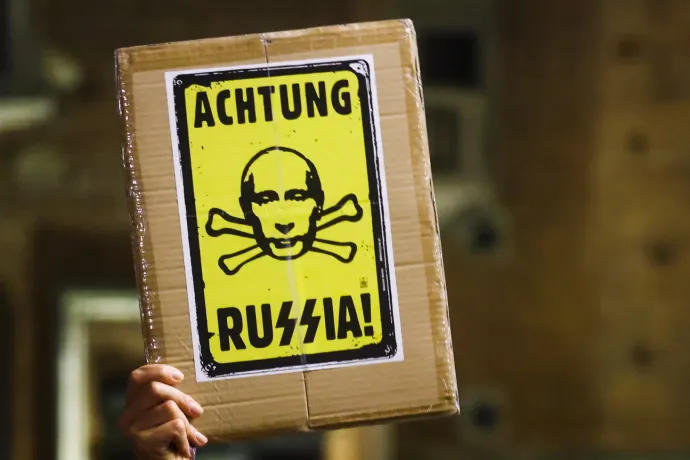A third of Hungarians consider Russia a serious military threat to its neighbouring countries

While 77% of Poles believe that Russia represents a serious military threat to its neighbours, just under a third (33%) of Hungarians consider contemporary Russia to be a serious military threat to them.
And while a quarter of Hungarians (27 percent) do not believe Moscow poses any threat to its neighbours, only 5 percent of Poles are of the same opinion, according to a survey of Polish and Hungarian public opinion on international relations published on Monday by the prestigious Pew Research Center. The parallel survey is part of a wide-ranging international comparative study, with some of the findings having already been published by Pew at the end of June.
The institute's staff personally interviewed 1,007 people in Hungary and 1,022 people in Poland during April and May 2023, and then weighted the answers according to the demographic composition of the two countries. The number of respondents shows that Pew's Hungarian sample was bigger, as Poland's population is almost four times that of Hungary. When assessing the data, it is also worth bearing in mind that they do not yet reflect certain political events and processes – for example, the Ukrainian offensive, which has progressed at a slower pace than international public opinion expected, or the dispute over grain imports, which has left its mark on Polish-Ukrainian relations.
The poll reveals that the public in the two countries drew very different conclusions from the Russian invasion of Ukraine in February 2022.
When asked whether it's important for their country to have a close relationship with the United States or Russia, 76 percent of Poles and 17 percent of Hungarians chose their NATO ally. This figure represents an increase of 47 percentage points for Poles compared to 2019. The majority of Hungarians (56 percent) believe that a good relationship with Russia and the US is equally important, while 11 percent of the population think a close relationship with Russia is more important.
Value-based responses are likely mingled with strategic-political considerations on this question, but the difference in values between the two countries is clearly visible in their perception of NATO. While 93 percent of Poles have a positive opinion of the military alliance, this number is only at 56 percent in Hungary – and while only 3 percent of respondents in Poland gave NATO a negative rating, the same proportion is 36 percent in Hungary.
The leading NATO power is also judged differently in the two countries: while 93 percent of Polish respondents have a positive opinion of the United States, this figure is 44 percent in Hungary – while the proportion of those with an unfavourable opinion of the US is 51 percent. Public opinion in both countries agrees that Washington prefers to interfere in the internal affairs of other countries, with 79 percent of Poles and 82 percent of Hungarians agreeing with this statement.
However, there's a difference when it comes to believing that the US is making a positive contribution to maintaining global peace and stability, with 85 percent of Poles agreeing with the statement, compared with just 34 percent of Hungarians. Pew analysts point out that the perception of the role of the US in global politics was equally poor in 2019 in both Hungary and Poland, but with the growing Russian threat, this perception has improved sharply in the latter case.
The perception of US president Joe Biden, who is constantly attacked by the Hungarian pro-government press is diametrically different in the two countries: while 83 percent of Poles trust the US president, 75 percent of Hungarians distrust him and only 19 percent of respondents expressed confidence in the Democratic president. Public opinion in the two countries is also divided over the performance of Ukrainian President Volodymyr Zelensky – while 70 percent of Polish respondents trust him, only 11 percent of Hungarian respondents do – in Hungary the proportion of people who distrust him is as high as 86 percent.
According to the Pew study, skepticism about allies does not translate into Russia-friendliness. 73 percent of Hungarian respondents have a negative opinion of Russia and 79 percent disapprove of Vladimir Putin's actions (in Poland, both are at 98 percent), while the percentage of those who support Russia and the Russian president in Hungary is only 23 percent and 19 percent respectively.
Despite the similarities in attitudes towards Russia, the perception of sanctions policy is again the exact opposite in the two countries: 67 percent of Polish respondents would increase the sanctions pressure on Russia by the United States and the European Union, and only 3 percent would relax the punitive measures – which is an increase of 19 percentage points since 2015. By contrast, in Hungary, where people have been bombarded with the slogans "inflation is triggered by the war" and " the sanctions don't work", 48 percent of the population would ease punitive measures on the Russian elite and leading players in the Russian economy, and only 8 percent of Hungarian respondents would prefer to see tougher sanctions.
Pew researchers measured a decline in the willingness for accepting refugees in both countries. While 80 percent of Poles and 63 percent of Hungarians were in favour of accepting "refugees fleeing war and violence" in spring 2022, a year later this figure had fallen by 28 and 14 percentage points (to 52 and 49 percent respectively) – but the willingness to receive refugees measured this spring is still much higher than it was in 2019. In fact, according to September figures, Poland is hosting almost one million Ukrainian refugees on a permanent basis, while Hungary is only hosting 50,000.
For more quick, accurate and impartial news from and about Hungary, subscribe to the Telex English newsletter!